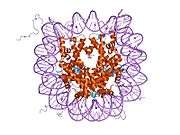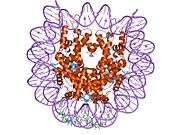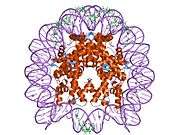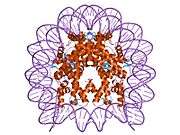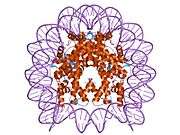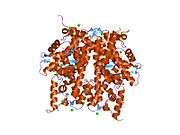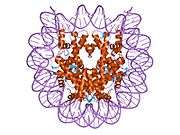HIST2H2AA3
| Histone cluster 2, H2aa3 | |||||||||||||
|---|---|---|---|---|---|---|---|---|---|---|---|---|---|
|
PDB rendering based on 1aoi. | |||||||||||||
| |||||||||||||
| Identifiers | |||||||||||||
| Symbols | HIST2H2AA3 ; H2A; H2A.2; H2A/O; H2A/q; H2AFO; H2a-615; HIST2H2AA | ||||||||||||
| External IDs | OMIM: 142720 MGI: 96097 HomoloGene: 116071 GeneCards: HIST2H2AA3 Gene | ||||||||||||
| |||||||||||||
| Orthologs | |||||||||||||
| Species | Human | Mouse | |||||||||||
| Entrez | 8337 | 15267 | |||||||||||
| Ensembl | ENSG00000203812 | ENSMUSG00000064220 | |||||||||||
| UniProt | Q6FI13 | Q6GSS7 | |||||||||||
| RefSeq (mRNA) | NM_003516 | NM_013549 | |||||||||||
| RefSeq (protein) | NP_003507 | NP_038577 | |||||||||||
| Location (UCSC) |
Chr 1: 149.84 – 149.84 Mb |
Chr 3: 96.25 – 96.25 Mb | |||||||||||
| PubMed search | |||||||||||||
Histone H2A type 2-A is a protein that in humans is encoded by the HIST2H2AA3 gene.[1][2][3][4]
Histones are basic nuclear proteins that are responsible for the nucleosome structure of the chromosomal fiber in eukaryotes. Two molecules of each of the four core histones (H2A, H2B, H3, and H4) form an octamer, around which approximately 146 bp of DNA is wrapped in repeating units, called nucleosomes. The linker histone, H1, interacts with linker DNA between nucleosomes and functions in the compaction of chromatin into higher order structures. This gene is intronless and encodes a member of the histone H2A family. Transcripts from this gene lack polyA tails but instead contain a palindromic termination element. This gene is found in a histone cluster on chromosome 1. This gene is one of four histone genes in the cluster that are duplicated; this record represents the centromeric copy.[4]
References
- ↑ Marashi F, Prokopp K, Stein J, Stein G (May 1984). "Evidence for a human histone gene cluster containing H2B and H2A pseudogenes". Proc Natl Acad Sci U S A 81 (7): 1936–40. doi:10.1073/pnas.81.7.1936. PMC 345411. PMID 6326092.
- ↑ Mannironi C, Orr A, Hatch C, Pilch D, Ivanova V, Bonner W (Jun 1994). "The relative expression of human histone H2A genes is similar in different types of proliferating cells". DNA Cell Biol 13 (2): 161–70. doi:10.1089/dna.1994.13.161. PMID 8179821.
- ↑ Braastad CD, Hovhannisyan H, van Wijnen AJ, Stein JL, Stein GS (Nov 2004). "Functional characterization of a human histone gene cluster duplication". Gene 342 (1): 35–40. doi:10.1016/j.gene.2004.07.036. PMID 15527963.
- 1 2 "Entrez Gene: HIST2H2AA3 histone cluster 2, H2aa3".
Further reading
- Allen BS, Stein JL, Stein GS, Ostrer H (1991). "Single-copy flanking sequences in human histone gene clusters map to chromosomes 1 and 6.". Genomics 10 (2): 486–8. doi:10.1016/0888-7543(91)90337-E. PMID 2071153.
- Kaiser P, Mandl S, Schweiger M, Schneider R (1996). "Characterization of functionally independent domains in the human ubiquitin conjugating enzyme UbcH2.". FEBS Lett. 377 (2): 193–6. doi:10.1016/0014-5793(95)01323-7. PMID 8543049.
- Wang ZF, Tisovec R, Debry RW, et al. (1997). "Characterization of the 55-kb mouse histone gene cluster on chromosome 3.". Genome Res. 6 (8): 702–14. doi:10.1101/gr.6.8.702. PMID 8858345.
- Albig W, Doenecke D (1998). "The human histone gene cluster at the D6S105 locus.". Hum. Genet. 101 (3): 284–94. doi:10.1007/s004390050630. PMID 9439656.
- El Kharroubi A, Piras G, Zensen R, Martin MA (1998). "Transcriptional activation of the integrated chromatin-associated human immunodeficiency virus type 1 promoter.". Mol. Cell. Biol. 18 (5): 2535–44. PMC 110633. PMID 9566873.
- Deng L, de la Fuente C, Fu P, et al. (2001). "Acetylation of HIV-1 Tat by CBP/P300 increases transcription of integrated HIV-1 genome and enhances binding to core histones.". Virology 277 (2): 278–95. doi:10.1006/viro.2000.0593. PMID 11080476.
- Venter JC, Adams MD, Myers EW, et al. (2001). "The sequence of the human genome.". Science 291 (5507): 1304–51. doi:10.1126/science.1058040. PMID 11181995.
- Nemergut ME, Mizzen CA, Stukenberg T, et al. (2001). "Chromatin docking and exchange activity enhancement of RCC1 by histones H2A and H2B.". Science 292 (5521): 1540–3. doi:10.1126/science.292.5521.1540. PMID 11375490.
- Deng L, Wang D, de la Fuente C, et al. (2001). "Enhancement of the p300 HAT activity by HIV-1 Tat on chromatin DNA.". Virology 289 (2): 312–26. doi:10.1006/viro.2001.1129. PMID 11689053.
- Marzluff WF, Gongidi P, Woods KR, et al. (2003). "The human and mouse replication-dependent histone genes.". Genomics 80 (5): 487–98. doi:10.1016/S0888-7543(02)96850-3. PMID 12408966.
- Strausberg RL, Feingold EA, Grouse LH, et al. (2003). "Generation and initial analysis of more than 15,000 full-length human and mouse cDNA sequences.". Proc. Natl. Acad. Sci. U.S.A. 99 (26): 16899–903. doi:10.1073/pnas.242603899. PMC 139241. PMID 12477932.
- Lusic M, Marcello A, Cereseto A, Giacca M (2004). "Regulation of HIV-1 gene expression by histone acetylation and factor recruitment at the LTR promoter.". EMBO J. 22 (24): 6550–61. doi:10.1093/emboj/cdg631. PMC 291826. PMID 14657027.
- Yusufzai TM, Tagami H, Nakatani Y, Felsenfeld G (2004). "CTCF tethers an insulator to subnuclear sites, suggesting shared insulator mechanisms across species.". Mol. Cell 13 (2): 291–8. doi:10.1016/S1097-2765(04)00029-2. PMID 14759373.
- Zhang Y, Griffin K, Mondal N, Parvin JD (2004). "Phosphorylation of histone H2A inhibits transcription on chromatin templates.". J. Biol. Chem. 279 (21): 21866–72. doi:10.1074/jbc.M400099200. PMID 15010469.
- Aihara H, Nakagawa T, Yasui K, et al. (2004). "Nucleosomal histone kinase-1 phosphorylates H2A Thr 119 during mitosis in the early Drosophila embryo.". Genes Dev. 18 (8): 877–88. doi:10.1101/gad.1184604. PMC 395847. PMID 15078818.
- Wang H, Wang L, Erdjument-Bromage H, et al. (2004). "Role of histone H2A ubiquitination in Polycomb silencing.". Nature 431 (7010): 873–8. doi:10.1038/nature02985. PMID 15386022.
- Gerhard DS, Wagner L, Feingold EA, et al. (2004). "The status, quality, and expansion of the NIH full-length cDNA project: the Mammalian Gene Collection (MGC).". Genome Res. 14 (10B): 2121–7. doi:10.1101/gr.2596504. PMC 528928. PMID 15489334.
| |||||||||||||||||||||||||||||||||||||||||||||||||||||||||||||||||


